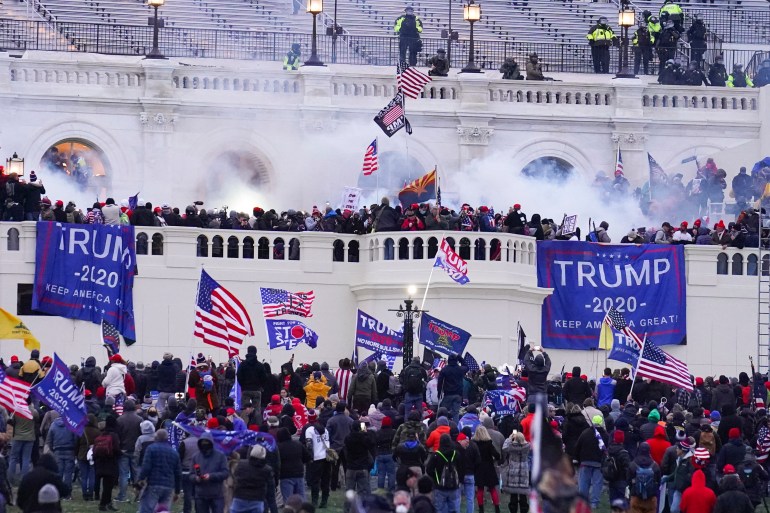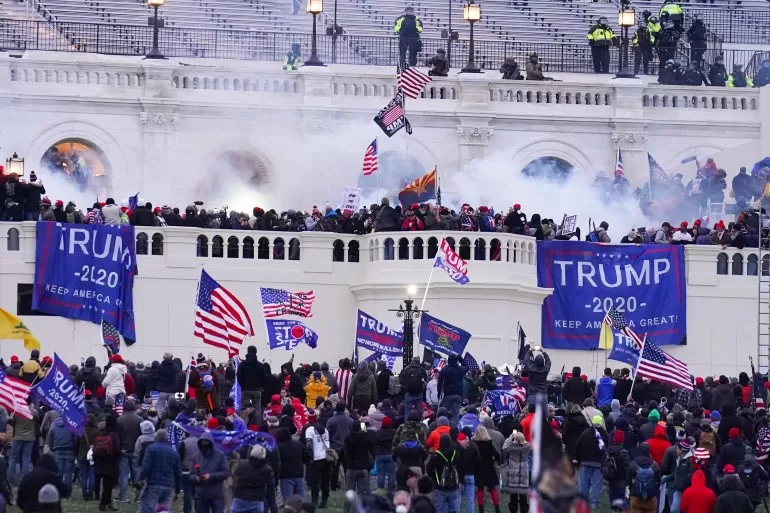He has suggested using the United States military against an “enemy from within”.
He has threatened to prosecute lawyers, Democrats and others whom he falsely accuses of committing electoral fraud, and pledged to carry out the “largest deportation operation” of undocumented immigrants in US history.
And once he is back in the White House, he has said he will be a dictator during his first day.
Now, as Donald Trump appears to be on the cusp of securing the 270 Electoral College votes that would win him the presidency, it remains to be seen whether the Republican will follow through with these incendiary campaign promises.
But experts have warned that Trump, if taken at his word, is gearing up to lead a loyalist-filled, authoritarian administration intent on “revenge” – and the programme he has in mind will have dire consequences for the country.
“What we get when you stack an administration with loyalists is you get the will of the minority reflected. There will be no coalition government,” said Rina Shah, a political strategist and former senior aide to Republican legislators.
“It’ll be about revenge against the Democrats,” she added. “It will be a scary iteration of the executive branch, scarier than we saw it.
“He wants to rewrite the rules. He’s told us as much.”
Campaign promises
Trump came to power in 2016 on a wave of public resentment. His pledge to “drain the swamp” of career politicians and other “elites” in Washington, DC, found favour among a significant portion of the population, disillusioned with government bureaucracy.
His fiery speeches and attacks on perceived rivals – both inside and outside of his own party – continued throughout his term in office, which saw him push through a range of contentious policies.
From 2017 to 2021, Trump’s administration was marked by a series of hardline measures – particularly on immigration and foreign policy – that often waded into murky legal territory or were struck down by the courts.
He followed through on some campaign promises, including withdrawing from the Paris Climate Accord, imposing a so-called “Muslim ban” and raising import tariffs.
Nevertheless, he failed to deliver on other pledges. For example, he never succeeded in completing a southern border wall and getting Mexico to pay for it.
A tally of Trump’s 2016 campaign promises by PolitiFact, a fact-checking organisation run by the Poynter Institute, shows that, of 100 promises made, the ex-president broke more than half of them.
Still, Trump’s rhetoric continued after 2020, when he failed to win re-election, and it reached new heights during his 2024 campaign to get back into the White House. He took aim at migrants, Democrats, reporters, prosecutors, judges and anyone else who disagreed with him.
Geoffrey Kabaservice, vice president of political affairs at the Niskanen Center, a centre-right think tank in Washington, DC, said Trump’s supporters are hoping he will use his second term to go beyond what he did the first time around.
That could mean carrying out his promise to deport millions of undocumented immigrants from the country, to weaponise the Department of Justice, or to fire tens of thousands of civil servants, Kabaservice said.
It could also involve enacting measures included in Project 2025, a right-wing policy blueprint that Trump has tried to distance himself from but was written by conservatives with ties to the former president.
“Whether that’s the question of abolishing departments in the federal government, or whether that’s a matter of restricting voting rights, you can go down the list,” Kabaservice told Al Jazeera.
‘True believers’
There is a possibility, however, that Trump may not try to carry out some of his controversial goals, Kabaservice said. They could also be thwarted by “the courts, by the deep state, by the public reaction, or maybe, simply, just the incompetence of the administration”.
Kabaservice told Al Jazeera that Trump appears poised to bring in “true believers” rather than the “so-called adults in the room” – the politicians, bureaucrats and other experienced Republicans who tried to moderate his impulses during his first term.
He noted that some critics fear that “if Trump brings in his true believers, then they will be radicals, and he will be unfettered by the kind of restraints that operated on him in his first term”.
But he said there is a second scenario that could play out instead.
“It’s also equally possible to look at it [and say], Trump already went through almost all of the Republicans who had serious experience with governing, with making the bureaucracy work, with getting results,” he said.
“And now he’s going to be with a bunch of amateurs who won’t know what they’re doing – and they won’t get anything done.”
Shah also noted that many Republicans who might have otherwise agreed to serve in a second Trump term may refuse to do so in response to his actions on January 6, 2021.

That day marked a “turning point” for many Republicans, she said, as a mob of Trump supporters stormed the US Capitol to prevent the certification of the 2020 election results, which showed his loss at the ballot box.
Trump was impeached in the House of Representatives for “incitement of insurrection”, and his efforts to overturn the results are the subject of a continuing federal criminal case, as well as a state-level case in Georgia.
During these proceedings, US lawmakers and prosecutors have documented his refusal to stop the January 6 riot as it was unfolding. Trump has denied any wrongdoing.
Yet the insurrection “is the reason you cannot be your normal, regular, card-carrying Republican in a second Trump administration”, Shah told Al Jazeera.
If January 6 had not happened, Shah said she thinks traditional Republicans would have served in a second Trump administration, even if they disagreed with him.
“I heard that the first time around, as well. People saying, ‘We may not like Trump, but we are Republicans. Therefore, we would want to serve.’ I suspect there will be loads less of that this time because of January 6, 2021.”
Role of Congress
There is another key factor that will determine what Trump is able to accomplish as president: the makeup of the US Congress.
Erica Frantz, an associate professor in political science at Michigan State University who studies authoritarianism, explained that legislatures typically can act as a bulwark against strongman leaders.
She pointed to the case of Argentina, where far-right President Javier Milei’s attempts to move forward with controversial policies have largely been rebuffed because he does not have legislative support.
But if Republicans get control of both the US House of Representatives and the US Senate with Trump in the White House, the former president will be able to “get away with any policies that he chooses”.
“The door would basically be wide open for a slide to authoritarianism. I don’t say that lightly,” Frantz told Al Jazeera.
Republicans reclaimed control of the US Senate on Tuesday but control of the House of Representatives was not immediately clear.
Frantz said an “authoritarian power grab” typically involves several elements, such as purges of non-loyalists from a state’s bureaucratic system, interference with the courts and restrictions on the media’s ability to report.
“And then ultimately – and this is already starting to gain some steam – we would see meddling with electoral integrity,” explained Frantz. Those efforts could include disenfranchising voters and politicising how elections are run.
The Republican Party’s transformation into what Frantz described as a “personalist” party – centred around an individual – also means that Trump will not face any pushback from his own party.
The Republican caucus has grown to be “very much synonymous with Trump”, she said, noting that one-time critics of the former president have either been purged from the party ranks or fallen in line behind him.
“There is a lot that gets set in motion when you see leaders come to power backed by these sorts of weak and shallow parties that are really centred on the individual rather than policy,” Frantz said.
“When you have that situation, it really makes it easier for these leaders to get away with power grabs.”
